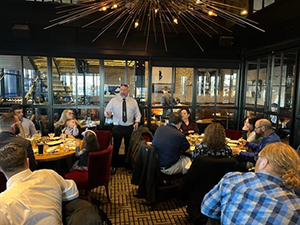1 August 2022
This is what NEHPBA is doing regarding the MA Climate Bill. We are working with the Massachusetts Coalition of Sustainable Energy (MCSE). The letter we sent to Governor Baker can be seen here. The bill was passed by the House and Senate on Friday and sent to Governor Baker's desk. Baker sent the bill back with his amendments and late Sunday, July 31, a compromise bill was sent back to Baker for his signature. We are still waiting... NEHPBA will let you know if this bill is signed or vetoed.

27 April 2022
 Tim Reed on "The Fire Time Podcast" was host to Joel Etter (NEHPBA President), Wayne Stritsman (outgoing HPBA Board Rep) and Karen Arpino (NEHPBA Executive Director) to discuss climate change and natural gas bans across the country and in the Northeast in particular. Listen to the Podcast: NEHPBA on the Battle of Electrification. And, if you don't listen to Tim Reed regularly, you should!
Tim Reed on "The Fire Time Podcast" was host to Joel Etter (NEHPBA President), Wayne Stritsman (outgoing HPBA Board Rep) and Karen Arpino (NEHPBA Executive Director) to discuss climate change and natural gas bans across the country and in the Northeast in particular. Listen to the Podcast: NEHPBA on the Battle of Electrification. And, if you don't listen to Tim Reed regularly, you should!
Want to listen on a different platform? You can, just click the link below.
8 April 2022

April 9, 2022
FOR IMMEDIATE RELEASE
Statement from the Northeast Hearth, Patio and Barbecue Association in response to MA Senate Climate Bill
Sudbury, MA – The Northeast Hearth, Patio and Barbecue Association (NEHPBA) released the following statement today:
The Massachusetts Senate Climate Bill is a major disappointment and a framework for severe disruption and job loss in the building and construction industry, significant inconveniences to homeowners and commercial property owners, and higher electric power rates that will hurt everyone. All of these negative impacts and economic injuries would result from a bill that guarantees more usage of dirty fuels such as coal and oil to generate electricity during peak demand periods.
Banning fossil fuel primary heating sources and mandating electric power in all new construction is bad policy. These types of mandates and policies demonstrate a lack of vision by the authors of this Senate bill, and acquiescence to that myopic approach by all those who voted to approve it.
The Commonwealth of Massachusetts needs a visionary approach to achieving our climate goals - an end result that the members of Northeast Hearth Patio & Barbecue Association strongly support. That means having a broad scope of options available to reduce building emissions. It means holding all energy producers accountable for decarbonizing their processes and fuels - not banning them. And it means the preservation of true energy diversity, so that major economic harm is not the unintended result.
About the Northeast Hearth, Patio & Barbecue Association
Since 1985, the Northeast Hearth, Patio & Barbecue Association (NEHPBA) has represented the interests of the hearth industry in the Northeast. NEHPBA was originally incorporated in January 1985 as the Northeast Solid Fuel Alliance (NESFA) in recognition of the unique demands of business in the Northeast. In June of 1992, NESFA members voted to become the first affiliated member of the national Hearth Products Association (HPA) and became the Northeast Hearth Products Association (NEHPA). In 2002, NEHPA became the Northeast Hearth, Patio & Barbecue Association (NEHPBA) in conjunction with the merger of the national HPA with the Barbecue Industry Association to become the Hearth, Patio & Barbecue Association (HPBA), thus recognizing the diversification of the modern industry. The NEHPBA name has remained since 2002.
24 March 2022

March 24, 2022
FOR IMMEDIATE RELEASE
NEHPBA warns that proposed bans on natural gas and propane would have a “profound impact” on life in the Northeast
Northeast Hearth, Patio and Barbecue Association: ‘Consumer choices are at risk’ Appliances, heating systems, fireplace usage, even how we grill on July 4th will be disrupted by gas fuel bans.
Sudbury, MA – The Northeast Hearth, Patio and Barbecue Association (NEHPBA) today warned that a gathering movement to ban natural gas and propane fuel in communities around the Northeast is placing fundamental consumer choices at serious risk - and threatens to disrupt household habits and traditions while imposing costly new rules on building construction.
“What does a ban on natural gas and propane in new housing development really mean? It means if you plan to build a new home that house will have: no gas stoves, no gas water heaters, no gas heating systems, no gas pool or spa heaters, no gas barbecues, no gas fireplaces, and no gas fire pits.” said Joel Etter, President of NEHPBA and Senior Wholesale Account Manager for Hearth & Home Technologies. “If you look deeper at these proposals around the Northeast, you immediately appreciate the profound impact this policy can have on your day-to-day life. These policies will affect how you heat your home, the appliances you use, what goes in your fireplace, and how you grill on your patio and deck over the Memorial Day weekend, Fourth of July and during other precious family times.”
The Northeast Hearth, Patio & Barbecue Association is a trade association representing more than 250 individual member retail and related companies throughout the Northeast. In just the states of New York and Massachusetts, NEHPBA has more than 140 members supporting over 900 families - the vast majority of which are independent “mom and pop” small businesses that are significant community contributors in the markets they serve across the region.
Proposed bans are also targeting new commercial and institutional buildings: most would prohibit new commercial buildings from using gas-fired boilers and halt restaurants from using gas stoves. Additionally: new health clubs, schools, and athletic facilities would not be able to heat commercial pools and spas with natural gas. Such restrictions would dramatically increase the cost of operations for all these types of facilities.
NEHPBA recognizes the changing landscape of the energy and fossil fuel industry. Its members are committed to working with government officials and regulators at all levels to increase access to more sustainable and climate-centric fuel sources throughout our homes and businesses. But a sensible long-term strategy to achieve responsible energy diversity must be the objective, as opposed to costly and damaging restrictions and bans that do little on their own to help reach our climate goals.
“Reducing dependence on natural gas will require an increase in electricity production because there will be a corresponding increase in demand for electricity. Unless that incremental electricity comes from specific sources, instead of reducing emissions gas bans can effectively just shift emissions from the building to electric generation sector,” said NEHPBA Executive Director Karen Arpino. “These changes would have a major impact on the most vulnerable among us. And unfortunately, this might be only the beginning. The next step will be for calls to retrofit existing homes and buildings to electricity at a potential cost of tens of thousands of dollars per household.”
More and more cities and towns around New England are considering proposed bans on natural gas or propane in new construction. The attorney general of Massachusetts has halted at least one local proposal because of doubts about its legality. Gas prohibition advocates, however, are also exploring ways to use state laws to accomplish a more broad-based ban.
“It’s likely that without expensive upgrades, the current electric grid may not be prepared to handle substantial electricity demand growth, which is exactly what would result from bans on gas and propane,” said Etter, the NEHPBA president. “Most importantly, these propane and gas bans take away consumer and business options and competitive pricing choices.”
About the Northeast Hearth, Patio & Barbecue Association
Since 1985, the Northeast Hearth, Patio & Barbecue Association (NEHPBA) has represented the interests of the hearth industry in the Northeast. NEHPBA was originally incorporated in January 1985 as the Northeast Solid Fuel Alliance (NESFA) in recognition of the unique demands of business in the Northeast. In June of 1992, NESFA members voted to become the first affiliated member of the national Hearth Products Association (HPA) and became the Northeast Hearth Products Association (NEHPA). In 2002, NEHPA became the Northeast Hearth, Patio & Barbecue Association (NEHPBA) in conjunction with the merger of the national HPA with the Barbecue Industry Association to become the Hearth, Patio & Barbecue Association (HPBA), thus recognizing the diversification of the modern industry. The NEHPBA name has remained since 2002.
21 March 2022
“My office is committed to promoting policies that ensure we are meeting our state’s climate goals in a way that is equitable and protects all of our state’s consumers. Today, we filed comments with DOER confirming that it has the authority to create a special opt-in energy code under the Climate Act that will provide municipalities the opportunity to impose all-electric requirements. We will to continue to work with cities and towns to support their efforts to help build our clean energy economy.”
BACKGROUND:
Today, the AG’s Office filed comments on DOER’s stretch code straw proposal, confirming that DOER has authority, under the Clean Air Act, to create a special opt-in energy code that includes all electric requirements.
Municipalities will have the option to adopt this specialized code under sections 31 and 101 of the Climate Act.
Once adopted, the municipality will be able to impose the all-electric requirements in their town or city notwithstanding any other state law that might be seen as conflicting.
In 2020, the AG’s Office successfully petitioned the Department of Public Utilities to investigate the future of natural gas in Massachusetts, becoming the third state to proactively plan for a transition away from fossil fuels.
Last month, the office called on the DPU to put forward both immediate and long-term reforms needed to ensure that the state’s residents and businesses don’t incur unnecessary costs as demand for natural gas declines.
Source: State House News
1 March 2022
Massachusetts Chimney Sweep Guild presented NEHPBA with a $5000 check at their annual MCSG dinner on Saturday night. The donation will help support our lobbying efforts!



Thank you to Dave Bancroft, Owner of Sweepnman and President of MCSG, the MSCG Directors, and to the Members! What fun to get a huge check!!!!
24 February 2022
Today, the NEHPBA Submitted our comment letter on the CAC Draft Scoping Plan for New York. Please see our letter here:

15 February 2022

February 15, 2022
FOR IMMEDIATE RELEASE
NEHPBA calls for Massachusetts legislative leaders to halt S. 1333 and its devastating economic and climate impact.
Northeast Hearth, Patio and Barbecue Association says allowing municipalities to adopt their own energy guidelines for building permits will have severe negative effects on cost, emissions.
Sudbury, MA – The Northeast Hearth, Patio and Barbecue Association (NEHPBA) today urged the Joint Committee on Telecommunications, Utilities and Energy to oppose S.1333 because of its potentially devastating impact on energy costs and the overall cost of living for Massachusetts households, and the likelihood that the bill’s allowance of municipalities to mandate all-electric heating in new construction will actually increase carbon emissions.
“Allowing municipalities to adopt their own energy guidelines and regulations for building permits will prohibit them from reaching their energy emission goals,” said Joel Etter, President of NEHPBA and Senior Wholesale Account Manager for Hearth & Home Technologies. “Allowing for change faster than is economically and technically realistic will increase costs, increase emissions, and result in “dirty” energy in the Commonwealth.”
The Northeast Hearth, Patio & Barbecue Association is a trade association representing over 60 member companies supporting 350 families in the Commonwealth - the vast majority of which are independent “mom and pop” small businesses that are significant community contributors in the markets they serve across the Commonwealth.
As currently written, Senate Bill 1333 proposes to amend Massachusetts General Law, Chapter 143, and allow municipalities to require new building permits to be all-electric and prohibit the building of new fossil fuel infrastructure.
“These policies would result in a drastic increase in electric rates and cost of living, along with the possibility of inhibiting access to more affordable sources of fuel and power,” said NEHPBA Executive Director Karen Arpino. “These changes would have a major impact on the most vulnerable among us.“
NEHPBA recognizes the changing landscape of the energy and fossil fuel industry. Its members are committed to working with government officials and regulators at all levels to increase access to more sustainable and climate-centric fuel sources throughout our homes and businesses. But the challenges we have now must be addressed.
For example: the price of electricity has increased drastically over the last year – even as demand has remained consistent. On January 25, 2021 the wholesale price for electricity was $40/MWh. On January 25, 2022 the price had risen to $200/MWh. Average prices to date in 2022 are about 80 percent higher than 2021.
New sources of energy from renewables are years away from being able to supply a consistent load that will make a difference in fuel mix needs. And while demand for electrical power continues to grow, energy supplies to generate electrical power are falling further behind. This is creating a huge burden on our regional transmission grid, creating extremely high prices. Allowing 351 municipalities to decide their own energy regulations would be unpredictable.
“Electricity has not only become far more costly because we are no longer utilizing natural gas pipelines, but it is also far dirtier as a result,” said Arpino. “Natural gas is becoming more and more difficult to access or prohibited. That means we forced to import electricity that is generated using dirtier fuels such as coal and oil.”
According to data collected by ISO-New England, 12 percent of New England’s electricity in January was produced using oil, which is a dirtier fuel that emits more greenhouse gases. Over the last year, oil’s share of the fuel mix had never risen above 0.9 percent; in January 2021, it was 0.2 percent. Natural gas was used to produce 44 percent of our region’s electricity in January 2022—the lowest level in over a year.
As heating and transportation are electrified, providing the new infrastructure will be critical to a consistent and cost-effective transition to a low-carbon economy. NEHPBA supports the creation of legislation that will modernize the electric grid and account for the changes and upgrades to the electric system, transmission, and storage.
About the Northeast Hearth, Patio & Barbecue Association
Since 1985, the Northeast Hearth, Patio & Barbecue Association (NEHPBA) has represented the interests of the hearth industry in the Northeast. NEHPBA was originally incorporated in January 1985 as the Northeast Solid Fuel Alliance (NESFA) in recognition of the unique demands of business in the Northeast. In June of 1992, NESFA members voted to become the first affiliated member of the national Hearth Products Association (HPA) and became the Northeast Hearth Products Association (NEHPA). In 2002, NEHPA became the Northeast Hearth, Patio & Barbecue Association (NEHPBA) in conjunction with the merger of the national HPA with the Barbecue Industry Association to become the Hearth, Patio & Barbecue Association (HPBA), thus recognizing the diversification of the modern industry. The NEHPBA name has remained since 2002.
25 January 2022

Where: Southbridge Hotel & Conference Center
14 Mechanic Street, Southbridge MA 01550
When: Monday, May 2, 2022 9:00am to 3:30pm

Along with a computer that has a webcam and microphone, you may bring a calculator to use during the exam. You may NOT use a smartphone for a calculator. There is an online calculator once you are in the actual exam.

6 January 2022
SYRACUSE, N.Y. (WSYR-TV) — As we ring in the New Year, many have reached out to the NewsChannel 9 Your Stories team wondering if you’ll still be able to burn wood or wood products in 2022.
They reached out to the New York State Department of Environmental Conservation (DEC) to find out if there are any changes to the current policy to ensure you know the most up-to-date rules as of today.
A DEC spokesperson confirms to NewsChannel 9, New York State is not considering passing legislation that would prohibit anyone to burn wood or wood products in 2022 at this time.
However, the state’s Climate Action Council (CAC) is researching ways to limit greenhouse gas emissions and achieve the goals of The Climate Act proposed by former President Barack Obama.
The draft of the CAC’s “Scoping Plan” does not contain any specific recommendations directly related to wood burning, but conversations are in the works about putting New York State on a path to an 85% reduction in greenhouse gas emissions by 2050.
In this drafted plan, members of the council’s advisory panel describe scenarios where wood consumption decreases within that time frame until 2050.
Starting Saturday, January 1, the Climate Action Council’s 120 day public comment period will begin.
The Council is seeking feedback from New Yorkers on these approaches to energy and emissions in New York. If you’re interested in weighing in, click here. NEHPBA will be creating our own Call-To-Action in the coming days.
The Council will also hold at least six public hearings across the State, both in-person and virtual. The goal is to release the final Scoping Plan by January 1, 2023.
Article Source: https://www-localsyr-com.cdn.ampproject.org/
21 December 2021
ALBANY - The council working on the beginning stages of a plan to dramatically reduce greenhouse gases in the state is looking into how reducing wood smoke could benefit the health of upstate New Yorkers.
The 22-member Climate Action Council is in the midst of a year-long study of how to achieve the goals of the Climate Leadership and Community Protection Act (CLCPA), an ambitious law passed in 2019 mandating the state reduce greenhouse gas emissions by 40 percent when compared to 1990 levels by 2030 and achieve net-zero greenhouse gas emissions by 2050.
During the October council meeting, New York State Energy Research and Development Authority (NYSERDA) Director of Energy and Environmental Analysis Carl Mas made a presentation predicting reducing wood smoke by 40 percent upstate could reduce non-fatal heart attacks, asthma-related hospital visits and deaths significantly.
Wood smoke upstate comes from home heating methods, such as wood stoves, pellet stoves and fireplaces, as well as campfires and industrial production.
The council is looking at two scenarios for decreasing greenhouse gases, one of which includes the use of biofuels and green hydrogen. The second scenario envisions transitioning to renewables without biofuels. Both call for reducing wood consumption by 40 percent “relative to business as usual” by 2050, according to NYSERDA.
This reduction would have the greatest health benefits in upstate New York, according to Mas’ presentation, because more wood is burned here.
Reducing wood burning would have two health benefits, according to Mas, though only one of them has to do with climate change.
The first is reducing the small, inhalable particles produced by burning wood.
Cary Institute of Ecosystem Studies President Emeritus William H. Schlesinger, a biogeochemist and expert on wood smoke, said burning wood produces large amounts of tiny particles called aromatic compounds, carbon-based molecules that can cause cancer.
It is also “increasingly believed by the medical profession” that breathing particles from wood smoke can lead to increased rates of Alzheimer’s and Parkinson’s diseases, Schlesinger said.
Wood smoke produces far more of these inhalable particles – some of which are carcinogenic – than all other forms of combustion in the state combined, according to Mas’ presentation.
Reducing wood consumption by 40 percent in New York would have quantifiable benefits, according to Mas’ presentation, with per capita health benefits from 2020-2050 of between $3,000 and $4,000 for Albany County and much of the Catskills.
Reducing wood burning would also reduce the amount of nitrogen oxide released into the atmosphere. Though burning wood only produces a tiny silver of all the nitrogen oxide released into the state’s air, the chemical has a drastic effect on climate change. A pound of nitrogen oxide has as much of an effect on the atmosphere as 265–298 pounds of carbon dioxide, according to the EPA.
Burning wood produces more nitrogen oxide than burning oil or natural gas, according to NYSERDA.
The council has not released its recommendations on how to reduce wood smoke upstate, but the task appears challenging, as wood, unlike other fuels, can be gotten for free by just foraging for it.
Kyle Morrison, who took over Gem Stove and Fireplace Company in Greene County from his grandfather a year ago, said wood stoves and pellet stoves are attractive to people because their fuels are cheap.
“Recently, with times changing and fuel prices going up, a lot of people are getting into wood,” he said. “Our wood stove sales have been absolutely through the roof this year – pellet stoves as well were through the roof – we’re up about 230 percent in sales compared to last year.”
Morrison said his business has never recommended heating a home only with a wood or pellet stove, but that people requested it anyway. For many who aren't on municipal gas lines, choosing an alternative heat source like wood, oil or propane is a necessity.
A ton of wood chips costs $330, and most homes only need two to three tons to get through a winter, making it cheaper than propane, Morrison said, adding that those with access to firewood could essentially heat their homes for free.
New York isn’t the only state to set climate goals. Vermont released its draft Climate Action Plan in November, which has similar goals to New York’s but different methods. Notably, Vermont’s plan actually endorses burning wood as a way of cutting emissions.
“Efficient wood heat – whether with efficient stoves or automated boilers and furnaces – both reduce greenhouse gas emissions and can save consumers money compared to fossil heat,” according to the plan.
Vermont’s plan endorses switching “from fossil-fuel dependent heating systems to cleaner and more efficient systems” including efficient wood stoves and heat pumps.
Though New York’s Climate Action Council has not yet made its recommendations, it is considering models where all new heating systems installed after 2035 would be heat pumps – low-energy systems that pull air from the surrounding air or ground to heat and cool homes.
State Sen. Daphne Jordan, whose district includes Columbia County and part of Rensselaer, Saratoga and Washington counties, said her initial question was “if anyone at the council has reached out to, or even considered, the estimated hundreds of thousands of New Yorkers, the vast majority of whom live in upstate and rely on wood to heat their home, to gauge their thoughts and concerns about this potential proposal?”
“…Wood remains a reliable, affordable, accessible fuel source” Jordan's statement continued. “Before Albany rushes forward with potential new mandates on the use of wood for home heating – mandates that would appear to target upstate – the Council should carefully consider the potential negative impact of such a proposal on family budgets.”
The council’s recommendations are due at the end of the year.
Source: Albany Times-Union
13 December 2021

Winter officially arrives on December 20 and Americans should expect to spend more to heat their homes than last year.
The U.S. Energy Information Administration predicts home heating costs will go up because fuel prices are rising, and demand has increased over the previous winter. The good news is that recovery since the depths of the COVID-19 economic decline is driving the trend. But it still won’t help households struggling to make ends meet cope with a jump in heating costs.
It’s another reminder that, especially during periods where all sources of energy are seeing price increases, energy diversity in the marketplace is the best strategy for consumer choice, safety, and cost control.
Federal officials say homes that heat with natural gas will pay as much as 30 percent more this winter – with an average cost of $746 to make it through the cold months. But households using all fuels are expected to see increases. While electric heat is expected to increase at a more modest rate—the cost of electricity already leaves many families little wiggle room in their budgets. The Energy Information Administration says homes that rely on electric heat will spend a whopping $1,268 on their electricity bills during the winter season.
Homes that rely on heating oil, meanwhile, will pay about 43 percent more this winter. And propane fuel users will pay more than 1.5 times what they did last year to heat their homes, according to the EIA.
“Tough winters and challenging economic cycles really demonstrate how important it is for consumers to have access to clean, safe natural gas and all other sources of fuel,” says Karen Arpino, Executive Director of the Northeast Hearth, Patio and Barbecue Association. “There is a role for all sources of energy in providing consumer choices and real diversity in the types of fuel that are available.”
Advocates who are pushing to limit access to natural gas and other fuels while at the same time promoting all-electric homes do not have the best interests of the American household in mind.
“Imagine how much higher costs would be this winter if our energy choices were drastically limited? New natural gas furnaces are more than 90 percent efficient and 16 times less expensive than electric heating,” Arpino says. “All-electric homes are also less reliable and less safe during major weather events and natural disasters.”
NEHPBA is part of a coalition of organizations, individuals and industry groups fighting natural gas bans and working every day to preserve true energy diversity. The association represents nearly 300 member companies – mostly individual retailers and service providers – that sell, install and service wood-fuel systems and provide expertise to consumers on primary and secondary home heating strategies .
“Americans have been through a lot over the past two years, and new challenges continue to emerge every day,” Arpino says. “Threatening to remove a family’s choice in how to meet a basic human need is outrageous. Our members will be there for their customers this winter, helping them get through it and make the most of their heating systems at a time of increased costs. And we will be there with them every day – fighting to maintain consumer choice and energy diversity.”
3 December 2021

The Vermont Climate Council passed an Action Plan on Wednesday by a vote of 19-4. The 273-page plan is part of the Vermont Global Warming Solutions Act which requires greenhouse gas emissions drop 26% by 2025 and 40% by the end of the decade. These are not goals, these are mandates and failure to meet these mandates is a violation of the Global Warming Solutions Act.
The thermal strategy is to ensure buildings use less energy while heating with more electricity. This means that 90,000 homes will need to be weatherized by the end of the decade-an increase of about 200%. The plan also requires a new “net zero” building code for new construction, efficiency standards for rental properties, and electric-only water heaters with modular demand response communication so the UTILITY companies can remotely control the water temperature. Also included in the plan is the creation of a Clean Heat Standard to incentivize heating companies to reduce their customer’s carbon emissions. Selling renewable liquid fuels, pellet stoves, and heat pumps would generate credits that fossil fuel wholesalers would be required to purchase.
As far as transportation goes, the plan uses incentives, taxes, and regulations to "persuade" Vermonters to buy and drive electric cars. By 2030, in order to meet the emission reduction mandates, 170,000 electric vehicles will need to replace gas-run vehicles. This is an increase of nearly 4000%. The plan allows for this by banning the sale of new combustion engine vehicles by 2035, giving cash incentives for electric vehicles and more fees to those who drive vehicles powered by gasoline and diesel. Additionally, even though MA, RI and CT have abandoned the Transportation Climate Initiative (TCI), VT has not. The plan calls on lawmakers to pass legislation that would allow the state to join the cap and trade program if it comes to fruition.
Governor Scott’s Administration released a signed statement disagreeing with many aspects of the plan. In the statement, Governor Scott said he “cannot support proposals which impose a fiscal commitment beyond the means of most Vermonters.” The electric stoves, cars, and heating systems that must be purchased in order to comply with the Global Warming Solution Act represent billions of dollars of new purchases. The Vermont legislature will pick up where the Climate Council left off in determining who pays the bill. The Legislature will start that process in January. NEHPBA will keep you updated!
17 November 2021

NEW YORK – Consumer Energy Alliance (CEA), the leading North American energy and environmental advocate for families and businesses, and the Northeast Hearth, Patio and Barbecue Association (NEHPBA), today testified during a public hearing of the New York City Council Committee on Environmental Protection about a suite of bills seeking to forcibly electrify existing buildings and phase out appliances like gas stoves.
See the full article here
Article & Image source: consumerenergyalliance.org
3 November 2021
The VT Climate Council is finalizing it's plan to eliminate fossil fuels in Vermont, and the cost of this effort is coming clearer. The plan calls for 80,000 air source heat pumps and 60,000 electric water heaters to be installed in Vermont buildings by 2025. On the road, 40,000 new electric vehicles will need to replace gasoline powered cars in the next three years. If this happens, the amount of electricity needed to fuel these cars and homes will be significant, an additional 796,000 MWhs. And the plan requires that these added electrons to come from local and renewable power plants. As one Climate Councilor admitted, Vermonters don’t yet understand "the Mack truck that’s coming at them" and “how this is going to impact their lives and what it’s going to cost.” The Climate Council will unveil the first draft of the Climate Action Plan next Tuesday. Here is a sneak peak.
So….what happens if this doesn’t happen? The law now provides that anyone can sue the state of Vermont for violating the Global Warming Solutions Act if emissions don’t drop by 26% in 2025 and by 40% in 2030.
Source: PGANE
27 October 2021
As the December 1 deadline in the Global Warming Solutions Act approaches, the planning work of the Vermont Climate Council is coming to an end and policy decisions are being made. Below are ten high priority actions discussed at VT Climate Council meetings last week.
Information from: PGANE
Members of the Northeast Hearth, Patio & Barbecue Association (NEHPBA) and its regional Affiliates are the leading companies that produce, sell, or service appliances and accessories in the hearth and barbecue industries in North America. Join today to take advantage of all the benefits your company will receive.
JOIN NOWServicing Massachusetts, Connecticut, New Hampshire, Rhode Island, Vermont, Maine, New York
Copyright © 2025. Northeast Hearth, Patio and Barbecue Association | All rights reserved.